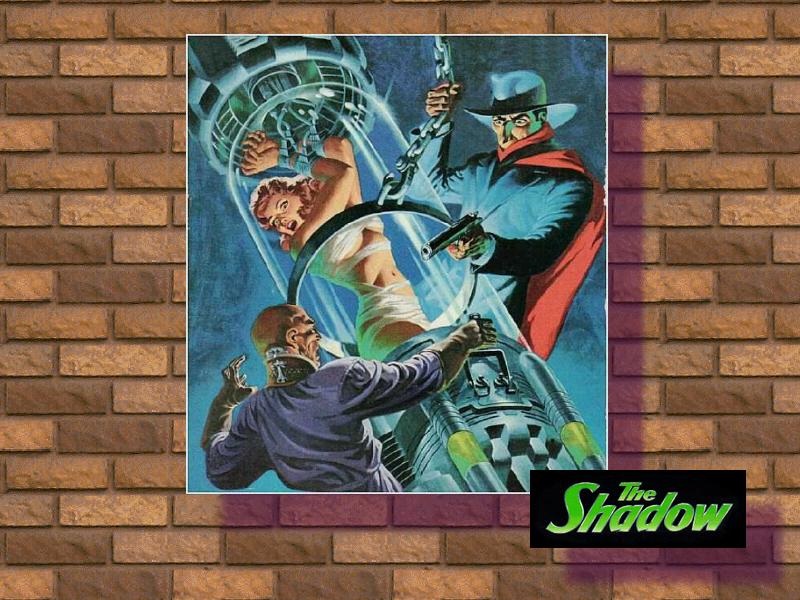The Strangest of Puzzles
Walter Brown Gibson leaned back in his chair for a well-deserved stretch after spending a number of hours hunched over his trusty Corona typewriter. He had just put the finishing touches on his latest contribution to The Shadow Magazine, a Street & Smith publication that resulted as a by-product from the introduction of CBS Radio’s The Detective Story Hour in July of 1930. The S&S-sponsored program was supposed to boost sales of their Detective Story Magazine, but because the unseen narrator of those broadcasts—known as “The Shadow”—became so popular with listeners, the company decided to launch another publication based on the character.
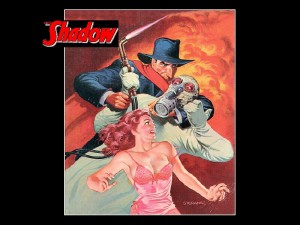 Gibson was in the right place at the right time. An author/editor with an insatiable interest in magic and the occult, he had submitted several of his fiction stories to Street & Smith for consideration for Detective Story…yet he was genuinely surprised when the company asked him to contribute a 75,000-word tale for what would be the premiere issue of Shadow Magazine. That story, “The Living End,” would be the start of Gibson’s prolific fiction-writing career; he had previously written articles on the subject of magic for a number of newspapers, in addition to designing crossword puzzles. As a nod to his lifelong interest in the art of prestidigitation, he adopted the pen name of “Maxwell Grant”—derived from the names of two of his fellow magicians, Max Holden and U.F. Grant.
Gibson was in the right place at the right time. An author/editor with an insatiable interest in magic and the occult, he had submitted several of his fiction stories to Street & Smith for consideration for Detective Story…yet he was genuinely surprised when the company asked him to contribute a 75,000-word tale for what would be the premiere issue of Shadow Magazine. That story, “The Living End,” would be the start of Gibson’s prolific fiction-writing career; he had previously written articles on the subject of magic for a number of newspapers, in addition to designing crossword puzzles. As a nod to his lifelong interest in the art of prestidigitation, he adopted the pen name of “Maxwell Grant”—derived from the names of two of his fellow magicians, Max Holden and U.F. Grant.
It wasn’t easy maintaining the over 1,500,000-word output that Walter wrote yearly for the monthly Shadow mag, but Gibson was fortunate in that he enjoyed what he did—describing himself as “a compulsive writer.” Yet even the most dedicated scribe knows when to “take five,” or what he himself termed as “pauses” once he had reached “the peak of progress.” He had done so earlier that evening, celebrating dinner with friends on the occasion of his birthday (September 12, 1897). Afterward, he returned to his typewriter in order to take up where he left off. It was now nearing the midnight hour, and it was time to recharge the batteries in order to begin another day of writing come the following morning.
 He leaned over to turn off the lamp on his desk…and that’s when he heard it. A laugh. A rather sinister-sounding laugh, to be sure…only Walter wasn’t actually sure he heard it. With a second attempt to dim the lights, he heard the laugh again. It definitely wasn’t his imagination this time. Then a voice broke the stillness.
He leaned over to turn off the lamp on his desk…and that’s when he heard it. A laugh. A rather sinister-sounding laugh, to be sure…only Walter wasn’t actually sure he heard it. With a second attempt to dim the lights, he heard the laugh again. It definitely wasn’t his imagination this time. Then a voice broke the stillness.
“Who knows…what evil…lurks in the hearts of men? The Shadow knows…”
There was another burst of sinister chortling, and Gibson chuckled to himself as well; he recognized the words as the standard opening to the radio program on which he often served as a consultant. All that was missing was the familiar strains of Saint-Saëns’ “Omphale’s Spinning Wheel.”
“Well, this is certainly an interesting birthday joke,” Walter called out to the voice. He looked around the room for signs of electrical equipment or even a filter microphone. Gibson knew enough about the art of illusion to recognize a leg-pulling when he experienced one.
“It’s no joke,” the voice replied. “This is The Shadow.”
“Sure. And I’m Chandu the Magician. Look, it’s a little late for pranks, my invisible friend…and I’ve got a busy schedule tomorrow. So why don’t…”
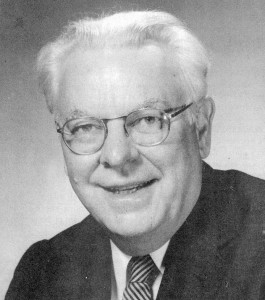 “Surely you wouldn’t begrudge me an opportunity to meet with my creator,” returned the voice. “Do I refer to you as ‘Walter Gibson’ or ‘Maxwell Grant’?”
“Surely you wouldn’t begrudge me an opportunity to meet with my creator,” returned the voice. “Do I refer to you as ‘Walter Gibson’ or ‘Maxwell Grant’?”
Gibson thought for a moment. Either the individual behind this practical joke had gone to elaborate extremes to try and convince him that a character he had created had come to life…or his rigorous work schedule was giving him a not-to-be-ignored sign that he was due for a long rest. Walter could see no upside to the latter part of that equation—so why not play along? Sooner or later, the person behind “The Shadow” would give himself away.
“Okay,” Gibson finally acquiesced. “Let’s talk.”
And talk they did—for the better part of…well, as to the time frame Gibson couldn’t say. Admittedly, Walter dominated the conversation: giving his mysterious guest a lively and detailed account of his life, with a heavy concentration on his interest in magic and his boundless enthusiasm for the written word. He felt a little funny describing for “The Shadow” how he came to create the character, combining the escape talents of the legendary Harry Houdini and the powers of hypnosis practiced by Tibetan mystics. He also added the expertise of renowned magicians like Blackstone (for which he would later contribute scripts in a 1948-49 Mutual quarter-hour radio drama) and Howard Thurston to create illusions…just for a little spice.
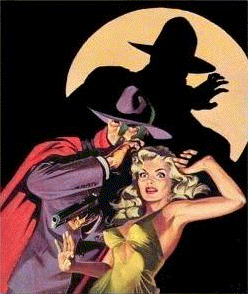 The oddest part of the conversation was when Walter Gibson suddenly realized that, in fact, Margo Lane was not “the only person who knows to whom the voice of the invisible Shadow belongs”—he created the character, so understandably he knew the Shadow’s identity as well! “Aren’t you afraid that I’ll reveal to the world that you’re really Lamont Cranston?” Walter asked his mystery guest. “Or I should say, former WWI aviator Kent Allard—if you’ve read any of my novels.”
The oddest part of the conversation was when Walter Gibson suddenly realized that, in fact, Margo Lane was not “the only person who knows to whom the voice of the invisible Shadow belongs”—he created the character, so understandably he knew the Shadow’s identity as well! “Aren’t you afraid that I’ll reveal to the world that you’re really Lamont Cranston?” Walter asked his mystery guest. “Or I should say, former WWI aviator Kent Allard—if you’ve read any of my novels.”
The Shadow gave out with a laugh…not a sinister one, but a hearty guffaw that said “You got me there, pal.” Gibson was relieved that his creation seemed to possess a sense of humor. What at first was an effort to show he was a good sport about a practical joke turned out to be one of the most enjoyable evenings the author had ever spent with someone who may or may not have actually been there. He even entertained his invisible guest with some magic tricks; though he wasn’t able to tell whether or not The Shadow actually enjoyed his efforts.
Then Walter Gibson awoke with a start. He was seated in his favorite chair in the room where he wrote—though, in truth, he wrote everywhere…keeping typewriters in every room of the house, since he never knew when inspiration would strike. The evidence would seem to suggest that he had nodded off shortly after completing his Shadow novel, and that his conversation with the character had all been a crazy dream.
He chuckled to himself and, returning to his typewriter, he noticed that there was a sheet of paper already in place—a habit he had adopted to make certain that he kept up his prolific output. For a moment, he thought about transferring the events of his dream to the page…and then Gibson hesitated. “No one would believe it,” he muttered to himself…as he embarked upon yet another well-written flight of fancy.
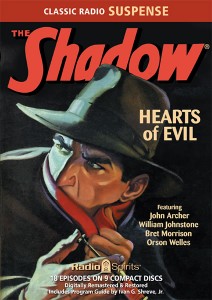 Today, Radio Spirits salutes the man responsible for creating one of the aural medium’s most enduring crime fighters on what would have been Walter Gibson’s 119th birthday. You’ll find a goodly number of his Shadow story reprints by “browsing the stacks”, and the broadcast adventures of the mysterious hero who knows “the weed of crime bears bitter fruit” are available in the following collections: Bitter Fruit, Dead Men Tell, Dream of Death, Knight of Darkness, Radio Treasures, Silent Avenger, and Strange Puzzles. Our latest compilation of Shadow broadcasts, Hearts of Evil, will be released soon; I was pleased to contribute the liner notes for this set, as well as indulging in a little frivolity today for Mr. Gibson’s natal anniversary tribute.
Today, Radio Spirits salutes the man responsible for creating one of the aural medium’s most enduring crime fighters on what would have been Walter Gibson’s 119th birthday. You’ll find a goodly number of his Shadow story reprints by “browsing the stacks”, and the broadcast adventures of the mysterious hero who knows “the weed of crime bears bitter fruit” are available in the following collections: Bitter Fruit, Dead Men Tell, Dream of Death, Knight of Darkness, Radio Treasures, Silent Avenger, and Strange Puzzles. Our latest compilation of Shadow broadcasts, Hearts of Evil, will be released soon; I was pleased to contribute the liner notes for this set, as well as indulging in a little frivolity today for Mr. Gibson’s natal anniversary tribute.

